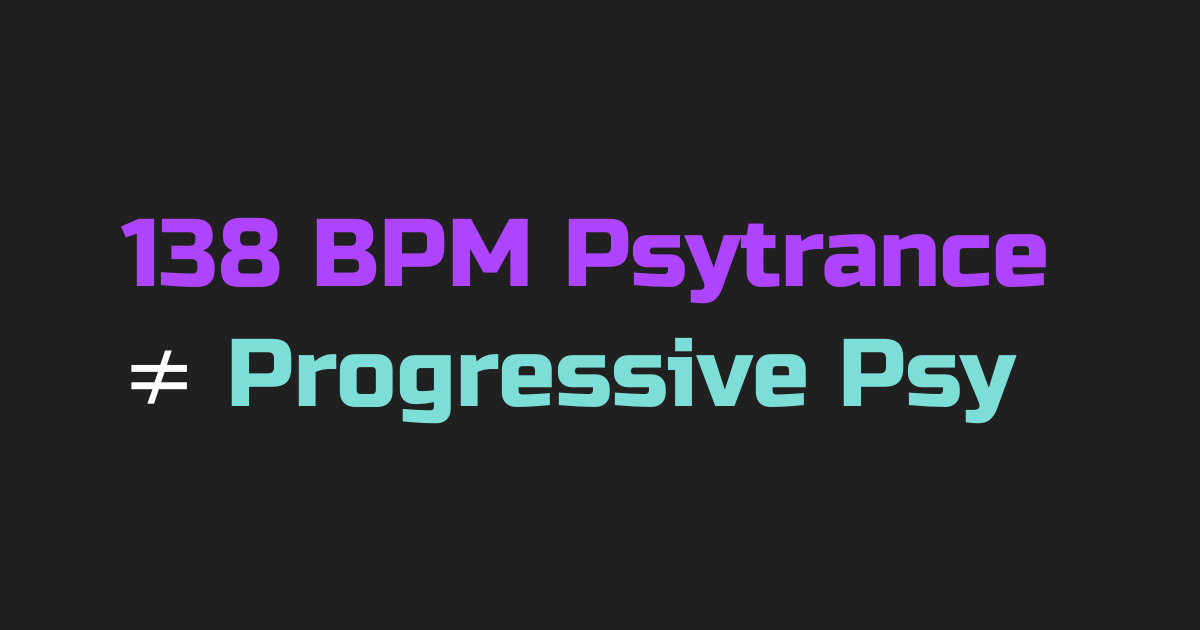What is Progressive
Or why Progressive Psy tracks you know are probably not Progressive at all

A few days ago I introduced Psytrance Guide and got tons of feedback. Most people are happy with subgenre names, some few are pissed-off. That’s fine.
But what’s interesting is that quite a lot of people were saying that the audio samples I’ve put in the Psytrance subgenre are actually Progressive Psy and not Psytrance. It’s not the first time when I see this misconception, so today I’d like to talk more about this and explain why this is wrong.
What does Progressive mean
First things first, the word “progressive” is an adjective that gives some quality characteristics to the noun. In music, words like this were introduced to describe a certain mood of the genre, for example:
| Deep | House |
| Hard | Techno |
| Uplifting | Trance |
| Progressive | Psy |
Eventually, these words became part of the genre names, but their original meaning hasn’t changed.
Progressive music gives a sense of progression and slow build-up over time
Talking about progressive specifically, it gives a sense of... well, you guessed it, — progression. Whereas in some other genres you just want to skip forward and finally listen to “that drop”, in Progressive music that sense of progression and immersive building-up is the goal itself. It’s very consistent, often with no climax or big emotional peaks which other genres typically have.
And the difference is not only in aesthetic. In progressive music, a sequence (whether it be a melody or, let’s say, a pad) lasts much longer, sometimes it can go pretty much the entire track duration as the opposite to non-progressive music which typically changes sequences every 16 or 32 bars.
In House and Trance
Before we get into Progressive Psy, let’s take a look at some progressive examples in other genres first.
This is a proper Progressive House:
See how smooth and straightforward these tracks are? If you just scrabble through you might think that nothing really happens in these tracks, it’s just the same loop keep going. But if you listen carefully from start to finish, you’ll notice how one layers builds-up over another, how it all sums up together in a mesmerising experience. This is what Progressive is all about.
Now let’s take a look at more trancy examples:
I intentionally put so different tracks here. As you can hear they vary in tempo and rhythmic patterns, however, each of these tracks has a clear sense of progression and slow build-up over time.
In Psytrance
As we approaching Psytrance territory, let’s take a listen to some older iconic tracks that widely considered as the roots of the Progressive Psy subgenre:
And here is some proper Progressive Psy of the present days:
As you can hear, the production quality certainly gets better over the past decade, and Progressive Psy as a subgenre has evolved becoming more dancefloor-focused. But the thing is, it still has the same smooth and straightforward progression just like the older Progressive Psy of the ‘00s and just like both Progressive House and Progressive Trance. And that’s the key point.
On contrast, here is what many people tend to believe Progressive Psy is:
You probably realise by now that this is not Progressive despite it share a similar tempo range and even the same driving bassline. The last track above might be especially tricky because it’s a remix of a Progressive tune, but don’t get confused: that climax by the end clearly puts it out of the Progressive territory.
Psytrance like this usually has much more prominent leads and overall more “occupied” sound spectrum with filtered leads, textures, acid riffs, one-shots, and special effects. Also, Psytrance typically has more beat interruptions, transitions, and breakdowns; one lead can start and in 16 bars after a totally different lead might come instead.
I hope now you see the difference that simply because a track has 136 to 138 BPM it doesn’t automatically put it into Progressive area.
I call everyone to love music regardless of its genre name, but since we have to use some names for our verbal and written communication with each other to describe music, let’s use the right names then.
Довольно познавательно. Я действительно всегда думал что lazer shot ето прог. Тащусь от vertical mode. Помойму одни из лучших в плане доводки и качества.
It was a wonderful lesson in analysis.
it was clear, but people still have a hard time accepting, especially here in Brazil!
I tried to get the name “Psytrance Classy,” but no one paid much attention. are already calling my sound (djset) until Full On. (LoL)
But we continue in the fight.
Is it possible to make the site / blog also in Portuguese-BR?
What a great article. Very helpful and clear. I enjoyed it.
So what would you call acts like blastoyz?
Just generic mainstream Psytrance, definitely not Progressive.
I’ve often puzzled over why everyone calls progressive trance (the anjunabeats vibe) “progressive”. There’s nothing really “progressive” about it. Maybe it’s some similarities in sound to “progressive house” but...
you decribed and explained so smooth and clear i felt progressive all the way haha, even with a insufficient english understood them all, i love even more the last paragraph, love to learn more stuff from you. thank you so much !!